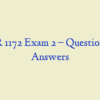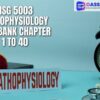Description
PSYC 418 Week 4 Exam – Question and Answers
- Feelings are so important in the counseling process that you should:
- The basic listening sequence can be used __________.
- “Will you do it?” Identify the stage from the five-stage model where an interviewer would most likely use this question.
- The basic listening sequence consists of which skills?
- The basic listening sequence can operate in which of the following settings?
- There is a distinctive difference between paraphrasing and reflection of Paraphrase focuses on __________ and reflection of feeling is concerned with __________.
- Client: Since my mother was diagnosed with cancer, I’ve been really worried and She just doesn’t look as well as she did before; she needs a lot more rest. Which of the following interviewer responses is reflection of feeling?
- “You’ve decided that you want to be more assertive with your That’s great, but now let us make a specific plan to take that idea home.” This is most likely what stage of the interview?
- When a client is depressed, you can expect less brain activity in the:
- The theory and philosophy of the five-stage decisional style is similar to:
- Which of the following will NOT help you practice reflection of feeling?
- The effective salesperson:
- The HPA system does NOT include:
- With some clients, the brief acknowledgment of __________ may be more appropriate.
- When a client feels anger, the __________ energizes the limbic HPA axis, and hormones lead to a faster heartbeat, higher blood pressure, breathing changes, and muscular tension.
- According to the five stages of interviewing, you can plan for termination, as appropriate, in this
- __________ clients may demonstrate a wrinkled nose and raised and pursed upper lip.
- Which of the following is true of positive emotions?
- Which of the following may NOT help clients slow down and regain control of their emotions?
- Which of the following is the emotional center of the brain?



